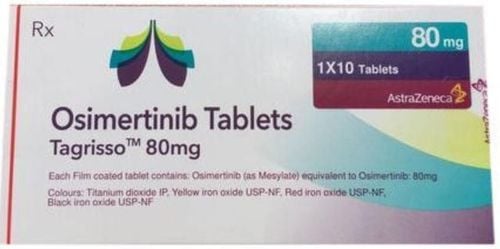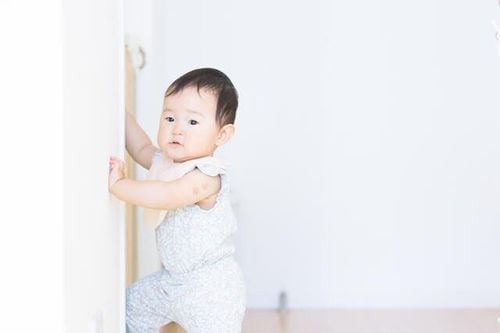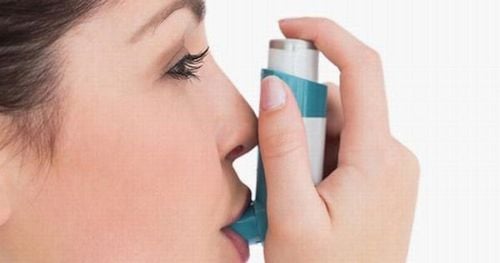This is an automatically translated article.
Coughing is a beneficial reflex to protect the airways and help children breathe easily. However, not a child who coughs violently and loudly is seriously ill and vice versa. Therefore, it is necessary to take the child to the doctor to determine the cause and treat it promptly.
1. Causes of cough in children
Cough is a reflex of the body to open the airways, protect the respiratory system. When the respiratory tract has problems and is attacked by viruses, bacteria, cigarette smoke, car smoke, dust, etc., the body reflex will cough to expel those viruses and bacteria.
Children can have a cough due to many causes ranging from mild to severe such as: colds, bronchitis, pneumonia, respiratory infections, allergies, asthma, air pollution...
In fact, many Research shows that family habits also affect the degree of cough in children. Habits of eating and drinking cold food, taking cold showers, running and jumping for a long time in the rain, playing in water... are triggering factors that easily initiate viruses into the body to cause disease. But most viral coughs in children are benign, requiring only home care.
Many parents wonder why children often cough in the cold season? Studies show that when babies are exposed to cold temperatures, the small blood vessels in the lining of the nose, throat, and upper respiratory tract constrict, reducing blood flow to these areas.
When blood supply is reduced, there is a decrease in the supply of nutrients and cells to fight pathogens in the blood. In addition, when it is cold, the low temperature creates a favorable environment to stimulate some viruses to develop well. Changing weather is also favorable for some viruses to survive longer, so the throat and nose are more susceptible to illness.
If the child has a good immune system, resistance, washes hands with soap, disinfects frequently, covers coughs and sneezes, the virus will be more limited. Parents pay attention to remind children to create good habits to maintain better health.
2. Notes when the child has a cough
2.1. Only give medicine to children when prescribed by a doctor When children have a cough, many parents often buy oral medicine or drops for their children by themselves. However, if the child is under 4 years old, parents should not arbitrarily give medicine without a doctor's prescription. It is important to find out what causes your baby to cough so badly to find the right remedies.
For children from 6 years old and above, parents can buy medicine at the pharmacy but need the guidance of the pharmacist at the counter. Do not arbitrarily buy drugs according to experience or family recommendations because children and adults may not use the same drug or dose.
2.2. What to do when a child has a cough? When a child has a cough, it is advisable to let the child rest more, monitor regularly to prevent the child from having a severe cough with difficulty breathing, and need to go to the hospital immediately.
Increase children's resistance by drinking breast milk or formula for children under 2 years old. In addition, it is necessary to add plenty of water, vitamin C and electrolytes for the baby.
A warm bath can also relieve a child's cough. Warm, hot steam will help your baby's airways relax. Parents need to sit with their baby when taking a sauna to avoid burns.
For children over 1 year old, parents can use warm lemon water with honey to reduce the child's cough. Absolutely do not use honey for children under 1 year old because it can cause poisoning, even death.
Regarding nutrition, parents need to limit their children's eating foods that are not good in reducing symptoms such as mint; chocolate; spicy, hot, greasy food or stimulants; carbonated drinks,... Should divide meals and feed children at least 1 hour before bedtime. If the child has a lot of cough and lasts a long time, parents need to take the child to see a doctor immediately for timely treatment.
In addition, parents also need to take their children to be fully vaccinated according to the vaccination schedule. This is the simplest, safest and most economical way to help children avoid coughs and other diseases related to the respiratory system.
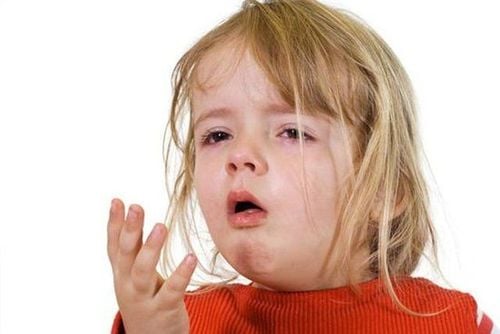
Không phải trẻ ho dữ dội, nặng tiếng là đang mắc bệnh nặng và ngược lại
3. Why do children cough violently at night?
Children have weaker immune systems than adults and do not know how to protect themselves, so they are very susceptible to colds and respiratory diseases. Of these, coughing - especially a violent cough at night is the most common. There are many reasons why children cough violently at night, including:
Low temperature, dry air: Night temperature is always lower than daytime temperature. During the change of seasons, the temperature difference between day and night can be as much as 10 degrees Celsius. The sudden change in temperature, plus the dry air at night and low air-conditioner temperature will cause children to catch colds and colds. Cough at night a lot. Sleeping without a pillow (resting) head: Cough is often accompanied by stuffy nose, difficulty breathing. And the cough will be worse if the baby sleeps with the head low. Because at this time, mucus and fluid from the nose will flow down the throat, irritating coughs. The bedroom is not clean: A bedroom that is not cleaned regularly will accumulate a lot of dirt, hair, pet hair,... Blankets, sheets, pillows, mattresses, and stuffed animals will have a great influence on the dust. to the infant's respiratory system. Because babies will accidentally inhale while sleeping, not only causing coughs but also making them sneeze, itchy nose, discomfort. Pharyngitis: Sore throat is a common disease in children. If the baby has a sore throat, at night, under the influence of external factors, the baby will cough and cough more easily than during the day. Accompanying this condition can be symptoms of fever, headache, swollen lymph nodes, ... Sinusitis: Children cough at night can also be due to sinusitis. At this time, the respiratory mucosa lining the sinuses becomes inflamed, edematous, and increases mucus secretion. At night when sleeping, this amount of mucus will flow down the throat, irritating the throat mucosa. This condition will cause the baby to cough a lot, even a violent cough. Asthma: Asthma is a chronic respiratory disease. People with this disease are often very sensitive and easily irritated to changes in weather or allergens. If accidentally exposed to one of these substances, the bronchi will swell, constrict, and increase mucus secretion. Patients will feel wheezing, shortness of breath, chest pain, cough. Therefore, if the child has a cough, especially a cough at night, the possibility of asthma cannot be ruled out. Gastroesophageal reflux disease: Although considered a common cause, few people know how gastroesophageal reflux disease is related to the condition of children coughing at night. Accordingly, if the baby has this disease, when sleeping, the backflow of air from the stomach to the esophagus will carry gastric acid. This amount of acid affects the tracheal nervous system, causing the trachea to stretch and stimulate the cough reflex.
4. What to do when children cough a lot at night?
Children coughing at night will make parents worried because it not only affects sleep quality but also has many other dangerous diseases. Here are the things parents need to do when they see their baby coughing a lot at night:
Every day, give the child plenty of warm water to drink and clean the nose regularly. For children under 3 months old, parents should use warm physiological saline and gently put it into the nose every morning and every night before going to bed. For children over 3 months old, mothers can use saline spray and spray directly into the baby's nose. If the child's nasal discharge is a lot, parents can perform nasal irrigation and suction. However, it must be done with proficiency and correct technique. In fact, cleaning the nose with physiological saline will help the child's airways open. The nose and throat will not be blocked by mucus. As a result, babies breathe easier and sleep easier at night. Rub cajeput oil and massage into the soles of the feet, chest, neck and back to keep the child's body warm and avoid cold. In addition, you can wear thin socks to help keep your baby's feet warm while sleeping. In order to keep the air conditioner temperature suitable (not less than 25 degrees Celsius), it can be combined with a nebulizer to humidify the air, helping children not to dry out their nose and throat. Clean the bedroom, periodically change blankets, sheets, pillows and mattresses for children's beds. This is very important for children with sinusitis, asthma, allergies. Let the child's head pillow with a soft, soft pillow, ensuring that the head is always higher than the chest at an appropriate level, avoiding too high or too low. This position will help the child breathe easily, and at the same time, limit the mucus from flowing from the nose to the throat. For children with gastroesophageal reflux disease, do not feed or drink milk too close to bedtime. Otherwise, the amount of food that has not been digested will make the child prone to belching, acid reflux, throat irritation and coughing.
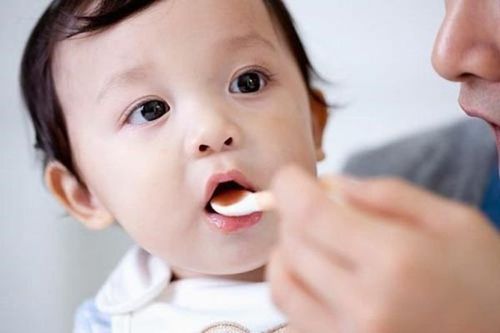
Nên cho trẻ ho dữ dội uống nhiều nước ấm và vệ sinh mũi thường xuyên
5. Take your child to the doctor if the cough doesn't go away
If you have applied the above methods, but the child's cough at night is still not relieved, especially when the following symptoms appear, parents need to take the child to the doctor:
Cough a lot, cough with thick, colored sputum yellow-green and foul-smelling; Cough with high fever and sweating in the afternoon; Coughing up blood with convulsions; Cough accompanied by vomiting; Cough accompanied by shortness of breath, chest tightness, cyanosis; Cough that is increasing, uncontrollable; Cough lasts more than 1 week, 10 days; Severe cough that comes on suddenly; Cough with high fever ; Cough with thick, green-yellow sputum, with a foul odor; Cough with weight loss, thin person, pale; Children refuse to eat, stop sucking, have difficulty swallowing, breathing; The child has a convulsion; The child is breathing faster than usual, breathing is thoracic constriction (the lower part of the ribcage recedes when the child inhales instead of expanding as usual); Children breathing with hissing sound; The child's breathing is very weak; Children still have a lot of cough, which does not decrease after 7 days of care; Children under 3 months of age with high fever. In general, children cough at night has many causes, to ensure safety, parents should take the baby to the doctor. Through the examination, the doctor will determine the cause and prescribe the appropriate treatment. Never self-medicate without a doctor's prescription.
With many years of experience in examining and treating diseases in children, now the Pediatrics Department at Vinmec International General Hospital has become one of the major health care centers, capable of examining , screening and treatment of many specialized diseases in children. Therefore, if the child shows signs of a long-term cough that does not go away or shows signs of respiratory infection, parents can take the child to Vinmec International General Hospital for examination and support. advice from doctors and health professionals.
Please dial HOTLINE for more information or register for an appointment HERE. Download MyVinmec app to make appointments faster and to manage your bookings easily.




